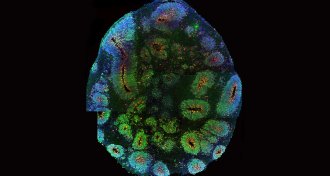Uncategorized
-
 Science & Society
Science & SocietyTo assemble a Top 10 list, Science News starts in June
Editor in Chief Nancy Shute discusses creating Science News' annual Top 10 science stories of the year.
By Nancy Shute -
 Climate
ClimateNew research may upend what we know about how tornadoes form
New data on the birth of tornadoes suggest that the twisters don’t form from the top down.
-
 Animals
AnimalsEndangered northern bettongs aren’t picky truffle eaters
Without the northern bettong, the variety of Australia’s truffle-producing fungi could take a hit, a new study finds.
-
 Animals
AnimalsCounting the breaths of wild porpoises reveals their revved-up metabolism
A new method tracks harbor porpoises’ breathing to collect rare information on the energy needs of the marine mammals.
By Susan Milius -
 Neuroscience
NeuroscienceBig data reveals hints of how, when and where mental disorders start
The first wave of data from the PsychENCODE project holds new clues to how and when psychiatric diseases such as schizophrenia emerge.
-
 Archaeology
ArchaeologyCorn domestication took some unexpected twists and turns
A DNA study challenges the idea people fully tamed maize in Mexico before the plant spread.
By Bruce Bower -
 Neuroscience
NeuroscienceHere’s a rare way that an Alzheimer’s protein can spread
Amyloid-beta found in vials of growth hormone can move from brain to brain, a mouse study shows.
-
 Animals
Animals50 years ago, armadillos hinted that DNA wasn’t destiny
Nine-banded armadillos have identical quadruplets. But the youngsters aren’t identical enough, and scientists 50 years ago could not figure out why.
-
 Astronomy
AstronomyThe Parker Solar Probe takes its first up-close look at the sun
NASA’s Parker Solar Probe survived its first encounter with the sun and is sending data back to Earth.
-
 Plants
PlantsHybrid rice engineered with CRISPR can clone its seeds
New research has created self-cloning hybrid rice, raising hopes of higher food production.
By Susan Milius -
 Health & Medicine
Health & MedicineBabies born in opioid withdrawal have unusually small heads
Infants born dependent on opioids had heads that were smaller than babies whose moms didn’t use the drugs during pregnancy.
-
 Humans
Humans‘Little Foot’ skeleton analysis reignites debate over the hominid’s species
Long-awaited analyses of the Little Foot skeleton have researchers disagreeing over resurrecting a defunct species name.
By Bruce Bower